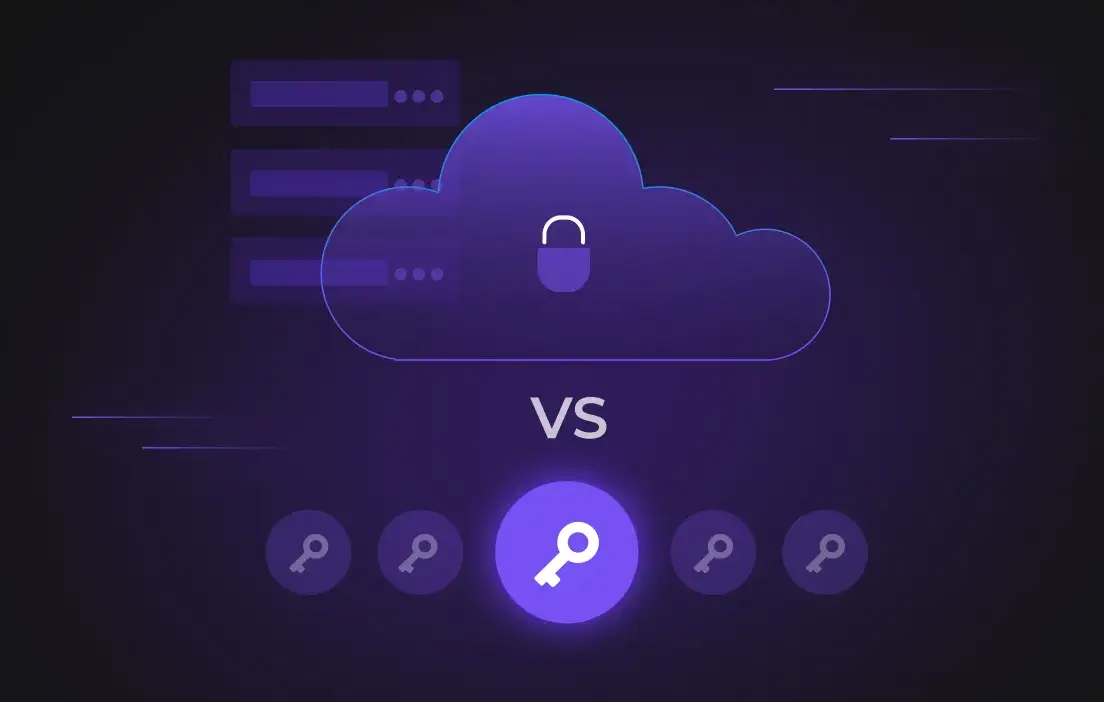As more businesses turn to cloud infrastructure, data security has become a top priority, especially when it comes to protecting cryptographic keys and sensitive workloads. Two primary tools enterprises consider are cloud hardware security modules (HSMs) and key management services (KMS).
In this article, we’ll dissect Cloud HSM vs KMS to help you understand which is right for your enterprise data security strategy. You’ll learn:
- What Cloud HSM and KMS are and how they differ
- Control, compliance, and scalability considerations
- Use cases for Cloud HSM vs KMS
- Augmenting the Cloud offerings with external security controls
- Cost and operational impacts of each
- How to align these options with your business needs
Whether you’re a security architect, CISO, DevSecOps lead, or a cloud architect looking for an encryption strategy to meet your needs, this guide will help you make an informed, confident decision.
What Is Cloud HSM? Why Enterprises Seek More than Hardware-Based Security
At the most basic level, Cloud HSM is a cloud-hosted hardware security module service that provides dedicated, tamper-resistant hardware for cryptographic operations and key storage. Unlike software-based encryption methods, Cloud HSM uses hardware as the root of trust, ensuring the highest level of protection for cryptographic keys.
The benefits of Cloud HSM include:
- Full control over keys: You decide how keys are created, stored, and destroyed.
- FIPS 140-2 Level 3 compliance: Essential for regulated industries like financial services, government, and healthcare.
- Hardware-backed cryptographic operations: Encryption, decryption, and signing are performed within a secure hardware boundary.
Typical use cases for Cloud HSM include hosting the root of trust for PKI or certificate authorities, securing digital signing processes for software supply chain integrity, and protecting payment card holder data to comply with PCI DSS.
If your organization is looking for strict control over cryptographic policies and operations or needs to meet stringent regulatory requirements, Cloud HSM offers a robust, auditable path to compliance and advanced data protection.
What is KMS? Simplifying Key Management in the Cloud
While Cloud HSM focuses on hardware-backed security, key management service (KMS) is a managed, software-centric approach to key management, typically integrated with the major cloud providers, including AWS, Azure, and Google Cloud.
KMS simplifies encryption operations by:
- Managing key lifecycle: Creation, rotation, and deletion are handled automatically.
- Integrating with cloud-native services: Databases, storage services, and serverless functions can encrypt and decrypt data without custom integration efforts.
- Making scalability easy: KMS is designed to scale with your workloads across regions and services.
- Optimizing costs: Eliminates the operational overhead of managing hardware appliances.
Gartner expects more than 60% of organizations to adopt multi-cloud KMS by 2027 as data moves across cloud services and geographic locations [source].
KMS is particularly valuable when adopting multi-cloud or hybrid environments, encrypting large-scale cloud workloads, or prioritizing ease of use and automation over granular hardware control.
Cloud HSM vs KMS: Differences That Impact Your Strategy
When it comes to cloud HSM vs KMS, there are four main factors to consider:
1. Control and Ownership
- With cloud HSM, your organization has complete ownership and control over cryptographic keys and policies. This means that your internal team will handle key creation, usage, and destruction, ensuring that no external party can access your keys.
- KMS provides simplified management, but the cloud provider manages the underlying infrastructure, which may not meet the strict compliance requirements that organizations in highly regulated industries are looking for.
2. Compliance and Regulatory Requirements
- Cloud HSM is preferred when FIPS 140-2 Level 3 compliance and strict data residency requirements are non-negotiable.
- KMS can satisfy many compliance requirements, but it could fall short in scenarios where direct hardware control is required for audits.
3. Integration and Scalability
- Cloud HSM requires more in-depth architectural planning and manual integration but comes with hardware-based cryptographic services that KMS cannot fully replicate.
- KMS integrates smoothly with cloud services for seamless encryption across your workloads.
4. Cost and Operational Overhead
- Since cloud HSM involves dedicated hardware, as well as a potential need for operational overhead for high availability and disaster recovery, costs could be higher.
- KMS often delivers a lower total cost of ownership with pay-per-use models, which reduce the complexity of maintaining dedicated hardware.
When to Use Cloud HSM vs KMS
Every organization has different needs, and there is no one-size-fits-all solution. But generally speaking, you should choose Cloud HSM if:
- You need to maintain control over cryptographic keys and operations.
- You require FIPS 140-2 Level 3 compliance for regulatory reasons.
- You run workloads with stringent security and audit needs, such as digital signing or securing payment processing.
On the other side, you should choose KMS if:
- You want a managed, scalable approach to encrypt workloads across your cloud environments.
- You need rapid integration with cloud-native services and SaaS platforms.
- Your compliance requirements can be satisfied with provider-managed key storage.
That said, this doesn’t need to be an “either-or” proposition. Many enterprises adopt a hybrid encryption strategy, using Cloud HSM for critical key management and root-of-trust operations while leveraging KMS for scalable encryption across workloads.
This layered approach enables you to strike a balance between security, compliance, operational efficiency, and cost.
External Controls to Augment Security
The Cloud HSM and KMS services offered on various Cloud platforms are powerful tools for data protection and identity security. Under some circumstances, however, additional security controls are required that can only be provided by an external KMS, not hosted on a Cloud provider.
A regional or national data sovereignty requirement may prescribe the use of external key management and protection, and some compliance regimens mandate that encryption keys are protected and managed on infrastructure different from the vendor that hosts the actual data.
Most Cloud infrastructure and platform providers support a form of external key management. This allows organizations to:
- Control the quality of keys used by the Cloud HSM or Cloud KMS by securely uploading key material generated in a known, trusted module
- Manage the lifecycle of keys used by Cloud services by remotely controlling key activation, rotation, and deactivation
- Act as an external root of trust for a Cloud KMS key store or key ring by hosting the Root or Master Key in an externally hosted, off-cloud KMS
- Separate cryptographic key management from data processing and storage
- Unify key management across multiple Cloud platforms using the external KMS to provide protection and control across all accounts and subscriptions at every Cloud vendor
- Comply with data sovereignty requirements by localizing access to the cryptographic keys that protect personal and confidential data
With its built-in HSM, powerful key management functionality, and scalable design built for the Cloud era, Fortanix Data Security Manager is the ideal external key manager for a variety of augmented cryptographic key security requirements.
Cost and Performance Considerations
When planning your enterprise encryption strategy, be sure to:
- Calculate the total cost of ownership over one to three years, factoring in API call rates for KMS and hourly HSM instance rates for cloud HSM.
- Classify data and services according to their cryptographic protection needs and determine which classes require security controls beyond what the Cloud platforms offer
- Consider the impact on performance for applications that require high-volume cryptographic operations.
- Evaluate the overhead needed to maintain cloud HSM configurations, backups, and disaster recovery plans versus KMS’s managed nature.
A structured cost analysis plan that aligns with your compliance mandates will help you avoid future redesigns and unnecessary expenses.
Crafting Your Enterprise Data Security Strategy
Choosing between cloud HSM vs KMS isn’t about picking a winner but about finding the right tool for the right workload. If your business needs granular control, hardware-based security, and strict compliance adherence, cloud HSM should be part of your encryption strategy.
If you’re looking for scalability, simplicity, and cloud-native integration, KMS can accelerate your encryption deployment. If your data protection or compliance requirements mandate additional security controls, consider adding Fortanix Data Security Manager to the mix.
In many cases, utilizing all these tools together will provide layered security that aligns with your data protection goals.
Are you ready to take on cloud encryption? Fortanix helps enterprises implement secure, compliant, and scalable encryption strategies with cloud-agnostic KMS and cloud HSM capabilities.
We simplify cryptographic operations while providing you with full control and transparency, whether your workloads run in the cloud, on-premises, or across hybrid environments.
If you’re ready to strengthen your enterprise data security, request a free demo to see how Fortanix can support your encryption journey.











